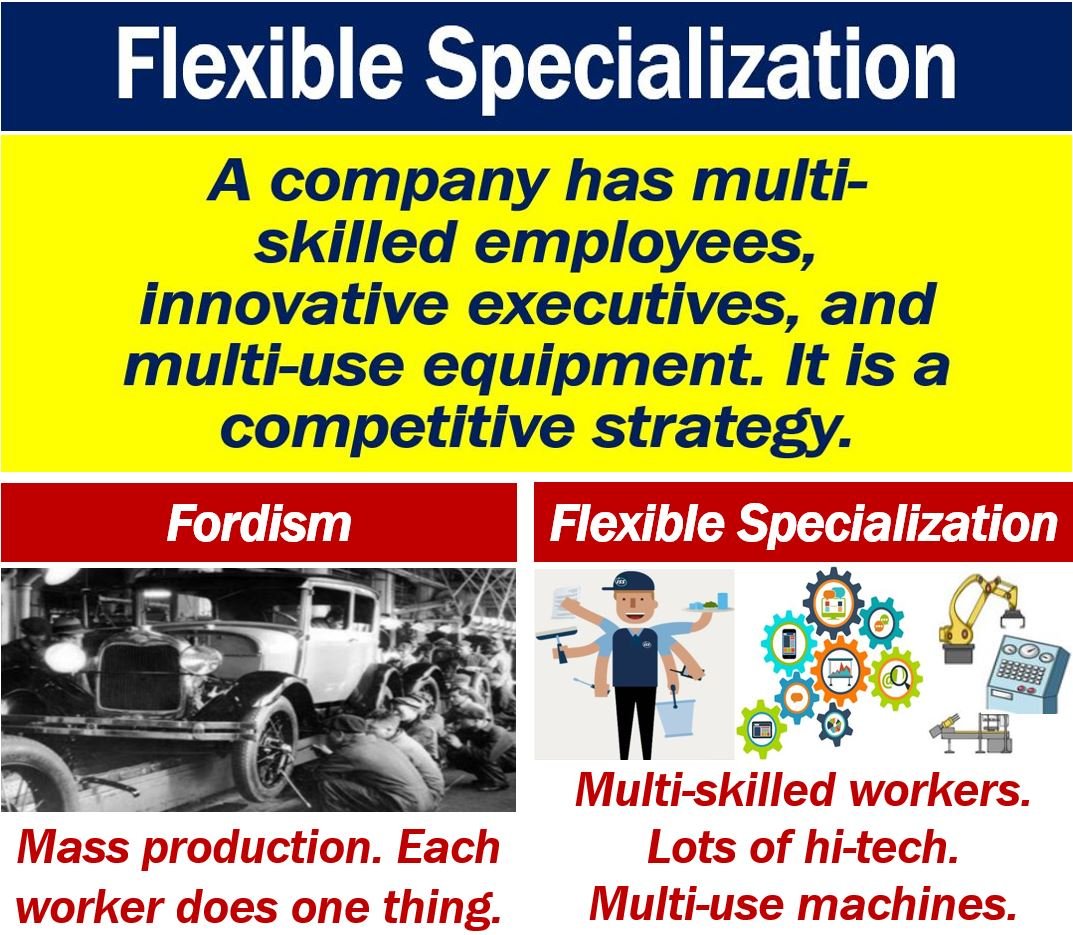Flexible specialization is a business strategy a company takes to make itself more competitive. The company has employees with multiple skills. It also has multi-use machinery and equipment. In other words, the company has people and equipment that can do many different things.
In today’s rapidly-changing marketplace, having the ability to adapt quickly is crucial. It is the only way to survive in some industries
In this context, the word ‘marketplace‘ means ‘market‘ in the abstract meaning of the word.
This term describes a business strategy where a company gets ready to handle change quickly and stay ahead of the competition. To do this, the company uses flexible equipment, employees who can do many different tasks, and creative leaders who can think on their feet.
It’s all about being able to adapt fast when the market or business environment suddenly shifts.
Do not confuse the term with ‘flexible staffing,’ which means not using permanent staff.

Flexible specialization – many companies
The term may also refer to an alternative production model. The model is based on the spread of production between many different producing companies, i.e., producers.
The producers, together, can rapidly respond to changing conditions and demands in the market.
This article focuses on the meaning of the term when it refers to one company. In other words, one company with multi-skilled employees and multi-use equipment.
Flexible specialization – Fordism
Flexible specialization contrasts with Fordism.
Fordism
Fordism was the system that Henry Ford’s car factories formulated at the beginning of the twentieth century.
In a Fordist factory, workers worked on a production line. They performed specialized repetitive tasks. Each worker focuses on thing.
A Fordist factory was a gigantic, mass-producing facility. It could not adapt rapidly to changing demands.
Flexible specialization
Flexible specialization or flexible production is a decentralized and fluid organization. It can adapt to a changing market rapidly.
In the world of industrial production, flexible companies have flexible factories.
A flexible factory is a production facility that can rapidly switch from making one thing to making something else. It can do this with the minimum of downtime.
Flexible specialization – Post-Fordism
Some people use the term ‘Post-Fordism’ when they mean flexible specialization. They use the term because it followed the system that Henry Ford’s vehicle factories formulated.
According to Wikipedia, Post-Fordism has the following features:
- Economies of scope, i.e., efficiencies formed by variety, not volume. With economies of scale, the focus is reducing average costs by producing lots and lots. Economies of scope, on the other hand, involve reducing average cost by producing more kinds of products.
- Producing things in small batches.
- Specialized jobs and products.
- Heavy use of information technologies.
- Rather than an emphasis on social class, there is an emphasis on types of consumers.
- The rise of the white-collar worker.
- Greater employment of women, i.e., the feminization of the workplace.
Flexible workforce
If you want a flexible workforce, flexible specialization is an effective strategy.
In this context, the term ‘flexible workforce’ means one with many multi-skilled employees. In other words, each worker in ‘flexible’ in what they can do.
